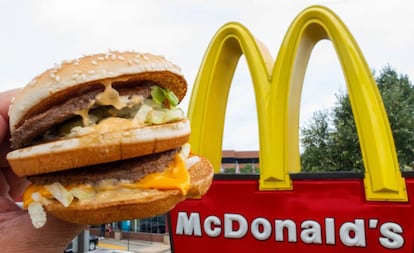McDonald’s loses exclusivity over ‘Big Mac’ brand in the European Union
The EU General Court’s decision only covers poultry products and restaurant services, categories that aren’t specifically related to the beef burger


McDonald’s has lost the ‘Big Mac’ war. The world leader in fast food will have to say goodbye to its monopoly over its popular name in its 6,881 franchised establishments in the European Union, according to a judgment by the General Court of the European Union, released on Wednesday. The decision only covers chicken sandwiches, poultry products and restaurant and drive-through services, categories that aren’t specifically related to the burger.
The Luxembourg-based court concluded that the fast food giant has not proved genuine use within a continuous period of five years of the ‘Big Mac’ brand on items made from chicken. Five years is the period of time in Europe that a trademark has to be used before it can be taken away. For this reason, it ruled in favor of Supermac’s, an Irish rival based in the coastal city of Galway. McDonald’s can still appeal the decision before the highest body of the European Union, the European Court of Justice.
McDonald’s uses the Big Mac name for its beef burgers. For this reason, the court refused to treat ‘Big Mac’ as synonymous with all the services and restaurants of the American chain. In this way, McDonald’s loses its exclusive rights to the Big Mac brand, which will allow other chains and companies to use this name to designate their products in the EU territory. The judge noted that “the evidence which was submitted by McDonald’s does not provide any indication of the extent of use of the mark” in connection with poultry products, including chicken sandwiches, or with restaurant and drive-through services, “in particular as regards the volume of sales, the length of the period during which the mark was used and the frequency of use.” The Big Mac name was registered by McDonald’s in the EU in 1996.
The litigation first arose in 2014 after McDonald’s opposed the Supermac’s trademark application in the EU, claiming that its resemblance to the U.S. chain could give rise to confusion. The legal fight gained momentum again in 2017, following an application for the revocation of the ‘Big Mac’ trademark filed by Supermac’s. The European Union Intellectual Property Office (EUIPO) partially ruled in favor of the Irish competitor in 2019.
Supermac’s, which since 1978 has offered a product similar to the American chain’s flagship sandwich in its 118 franchises, alleged that the distinction between ‘beef sandwiches’ and ‘chicken sandwiches’ was incorrectly recorded by McDonald’s in the international classification of goods, the so-called Nice Classification.
The American multinational has suffered a drop in sales in the Middle East due to a boycott over its operations in Israel. In addition, the company has received criticism from consumers in the United States about the supposed sale of a Big Mac for $18. The head of the company in the United States, Joe Erlinger, wrote a letter addressed to his customers counterattacking the “poorly founded” message that had gone viral on social media and claiming that McDonald’s has raised prices above inflationary rates.
Sign up for our weekly newsletter to get more English-language news coverage from EL PAÍS USA Edition
Tu suscripción se está usando en otro dispositivo
¿Quieres añadir otro usuario a tu suscripción?
Si continúas leyendo en este dispositivo, no se podrá leer en el otro.
FlechaTu suscripción se está usando en otro dispositivo y solo puedes acceder a EL PAÍS desde un dispositivo a la vez.
Si quieres compartir tu cuenta, cambia tu suscripción a la modalidad Premium, así podrás añadir otro usuario. Cada uno accederá con su propia cuenta de email, lo que os permitirá personalizar vuestra experiencia en EL PAÍS.
¿Tienes una suscripción de empresa? Accede aquí para contratar más cuentas.
En el caso de no saber quién está usando tu cuenta, te recomendamos cambiar tu contraseña aquí.
Si decides continuar compartiendo tu cuenta, este mensaje se mostrará en tu dispositivo y en el de la otra persona que está usando tu cuenta de forma indefinida, afectando a tu experiencia de lectura. Puedes consultar aquí los términos y condiciones de la suscripción digital.








































